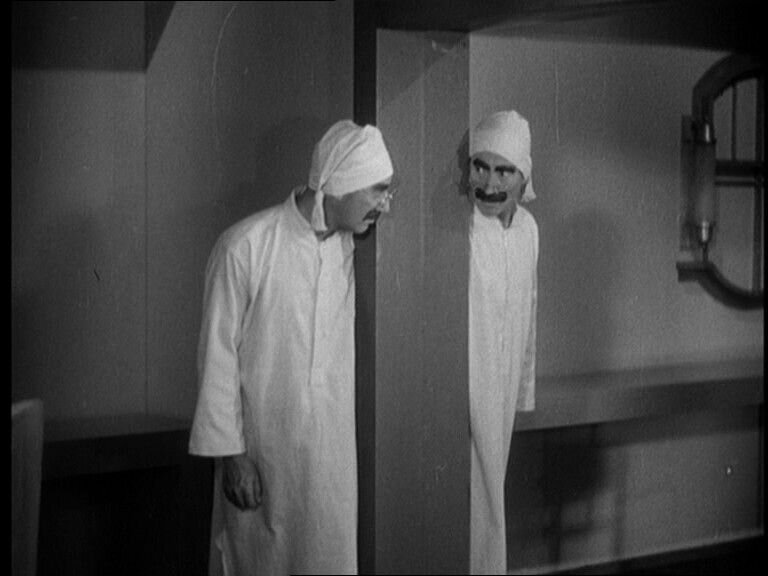Duck Soup (1933)
Written by Bert Kalmar, Harry Ruby, et al.
Directed by Leo McCarey
1998 List Ranking: 85
2007 List Ranking: 60
There is something notable about this list so far that I find rather interesting: there is a wide variety of genres represented. From drama, to horror, to comedy, it’s a diverse grouping that, in hindsight, seems sorely lacking from the list of Best Pictures. For example, we’re ten films into this list, and already we have our fourth comedy in Duck Soup. The diversity of the films on this list is really something, and it makes me excited to see some of the films coming up.
Harpo Marx
Back in 2002, when I was a junior in high school, our drama department put on a production of the play The Man Who Came to Dinner. Full of thinly-veiled allusions to real-life celebrities, I played a character called Banjo, who was based on Harpo Marx. Now, as an actor, I’m not typically a fan of watching someone else for reference, but in this case, as I was, in essence, imitating a real person, my director asked me to watch Animal Crackers, to study the habits of Harpo. I did, and we worked to incorporate many of his mannerisms into our production.
Until now, that was my only experience with the Marx Brothers and even then, I watched Animal Crackers purely for Harpo, not necessarily for the film itself. All this to say that after watching Duck Soup, I’m not entirely sure I get the appeal of the group.
Zeppo, Chico, Harpo, and Groucho Marx
Like many of their other films (apparently), Duck Soup pokes fun at the establishment with the four brothers’ personalities taking precedence over things like…plot. The country of Freedonia elects (or has elected for it) Rufus T. Firefly (Groucho) who basically does anything but lead. The ambassador to neighboring Sylvania wants to annex Freedonia, so he hires spies Chicolini (Chico) and Pinky (Harpo) to dig up dirt on Firefly. Of course, they don’t, spending their time accosting a fellow peanut vendor and just being nuisances over all. And Zeppo is there too.
I don’t quite understand just why I didn’t connect with this film. I’m all for the type of comedy that the Marx Brothers display, but I just found myself disinterested. Groucho’s pithy one-liners became tiresome rather quickly. Chico and Harpo fared a little better, with Harpo being the standout of the two, but even his antics began to feel overly-familiar, to the point where I just wanted the film to GET ON WITH IT. And Zeppo is there too.
Groucho and Harpo in the mirror sequence
That’s not to say that there aren’t great things about the film. As the film reaches the third act, there is a great sequence of Chico and Harpo breaking into the home of Mrs. Teasdale, where Groucho is staying. Here, because of plot reasons that I still can’t grasp, all three brothers end up donning identical disguises and interacting with each other and Mrs. Teasdale. Harpo really shines here, first while he tries to stop a stereo from blasting some John Phillip Sousa, and later when he breaks a large mirror. The mirror sequence is not original to this film, but its use here is, admittedly, pretty brilliant, with Groucho and Harpo’s gags becoming increasingly absurd. That sequence, and the earlier sequence featuring Chico and Harpo against the peanut vendor all switching hats were, for me, the best parts of the film. Oh, and Zeppo is there too.
The brothers in the film’s bizarre final sequence
It’s interesting to note that both of those sequences involve very little dialogue. I think that is what becomes exhausting after a while: the rapid fire puns and one-liners. I know some people love that stuff (and, as a former Jungle Cruise Skipper, you’d think I would too), but my taste runs more to the visual and the absurd or non-sequitur. As such, the film really shines in its moments of physical comedy, rather than verbal wordplay. I know I’m probably in the minority, but I think the Marx Brothers would be amazing in a silent film.
I think the Marx Brothers deserve the accolades they continue to receive for their contributions to comedy, but I can’t say that my taste and theirs align as much as I’d like. There is at least one more Marx Brothers film on this list, from a different era than this and Animal Crackers, so I am very interested to see how that film compares with this one. There will be at least one element missing from the next film: poor, painfully unfunny Zeppo.
FINAL GRADE: B-






